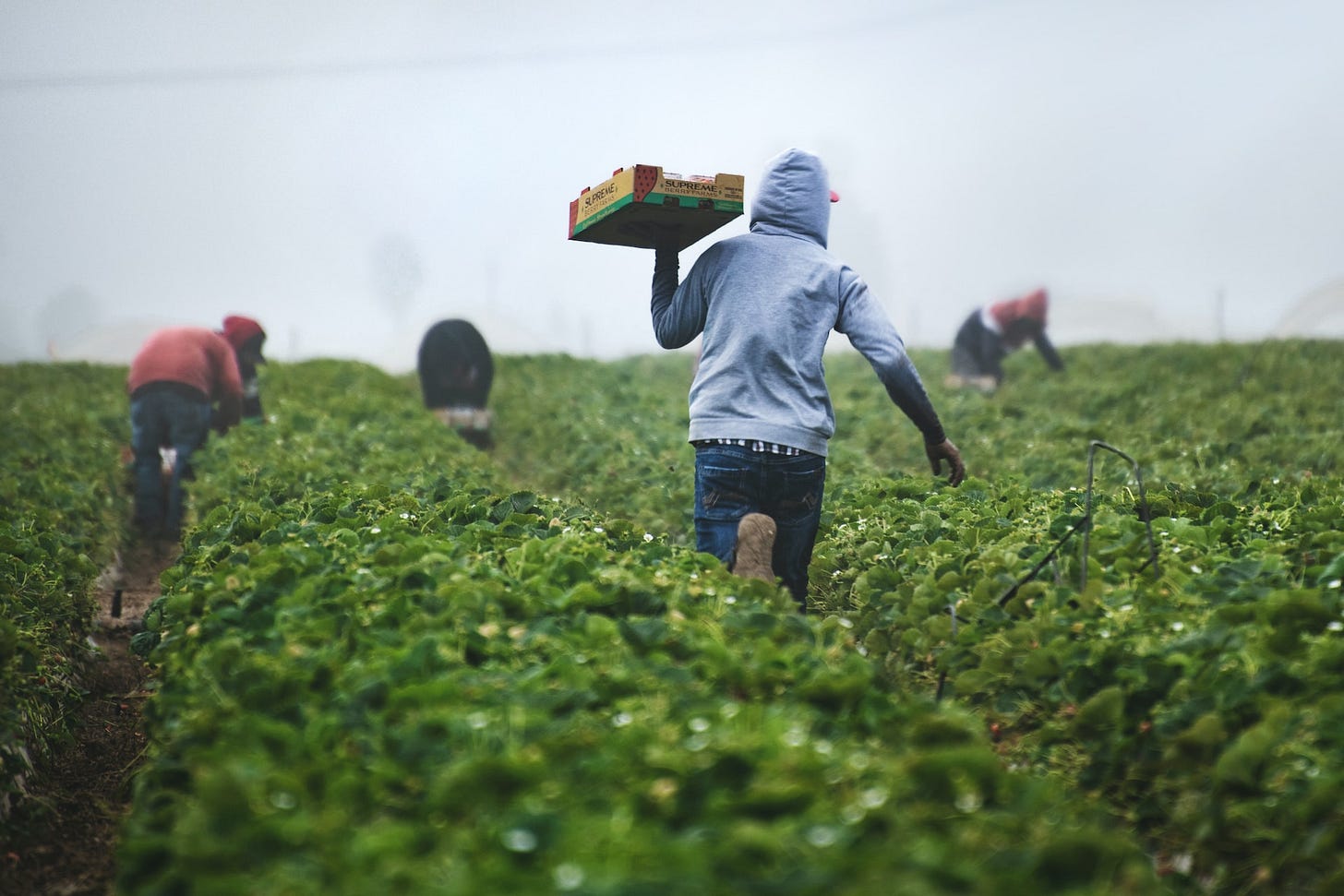The Deafening Silence Around Immigrants & the Food System
Nutrition professionals, it is time to speak up.

Black and brown immigrants from Latin America and the Caribbean are essential contributors to the US food system, but their labor, the risks to their lives through that labor, and ways that their marginalization is built into the food system are mostly rendered invisible when we talk about nutrition.
In Florida, a new law targeting undocumented immigrants is sowing fear and disrupting lives and livelihoods, particularly among agricultural workers. Signed by Governor Ron DeSantis in May, the law limits social services for undocumented immigrants, requires hospitals to collect data about a patient's immigration status, and voids out-of-state driver's licenses for people who cannot prove they are citizens. It also makes it a felony to transport immigrants across state lines who have not been "inspected" by authorities, and penalizes employers who do not use E-Verify, the federal online database used to verify if a person is eligible to work in the US, a requirement that agricultural businesses were previously exempt from. According to Ambrook Research, between 37% and 47% of those working in Florida agriculture are noncitizen immigrants.
Neza Xiuhtecutli, director of the Farmworker Association of Florida, estimates that there are about 300,000 farmworkers who live in the state illegally. Immigrants “are all over the agricultural industry,” he said. “We employ primarily farmworkers from other parts of the world, and not just Hispanic, but also Haitian and Jamaican farmworkers.”1
As anti-immigrant legislation and rhetoric continue charting their toxic path through mainstream American culture, nutrition professionals have the opportunity to speak up, to make visible the people and labor behind the food we eat, and to connect the circumstances of those people's lives to our own — why aren't we doing it?
I started thinking about this when I saw an Instagram Reel from Alice Figueroa, a Guatemalan registered dietitian, who started her caption with, "Latin American children are forced into child labor in the USA’s food industry and nutrition professionals are just ignoring it." She was talking about the New York Times investigation published in February that looked at the high number of migrant children hired illegally to do often dangerous jobs, many of them in the food industry. (If you haven't yet read it, here is a gift link: Alone and Exploited, Migrant Children Work Brutal Jobs Across the U.S.)
Migrant children are packing Cheerios, baking Nature Valley granola bars, operating milking machines, deboning chickens, and doing other dangerous jobs, often working long hours in addition to, or instead of, attending school. "Many of the brands and retailers accused of using child labor are brands that partner with the Academy of Nutrition and Dietetics, dietitians and chefs. Is that why we are all quiet?" Alice asked in her post. "Or is it because the children who are being exploited are brown, Latin American kids?"
She has a point. In my nutrition education, we talked about "cultural competency" and tailoring nutrition advice for the health beliefs and food preferences of Latine clients, but our classroom conversations didn't touch the topic of migrant labor in the food system, and how nativist rhetoric impacts the health and nutrition status of Latin American immigrants. I reached out to Alice and asked for her thoughts on this silence. "Without Latino/nes there would be little to no food on the American table," she told me.
They take jobs that are arduous and require knowledge of horticulture, physical stamina, mental acuity, dexterity, and agricultural skills. They take the jobs that Americans refuse to fill. Latin American immigrants, especially agrarian workers who are neglected and discriminated against, are the pillars that uphold the American agricultural sector. Every single time you enjoy berries with your oatmeal, sip a green smoothie, prepare roasted veggies for your children or a salad for your family, it is crucial to acknowledge the contribution of Latin American agrarian workers.
Dr. Hortencia Jiménez, a professor and sociologist originally from Nayarit, México, and the creator of the Dismantling Diet Culture: F*ck Being Calladita podcast, has pointed out the silence in the anti-diet space around the intersection of food, racism, and immigration. She wrote on Instagram, "When it comes to issues of immigration and food, all I hear are crickets."
She told me, "Discussions around anti-dieting and healing our relationship with food and body image also need to be centered on the working conditions of immigrants, the exploitable nature [of their labor, and] understanding how immigrants are also racialized in the food system." She sees a particular need for acknowledgement and better understanding of the sexual violence faced by Latina farmworkers and immigrant women working in the food system. "When we talk about healing our relationship with food, body image, dismantling diet culture — this is a social justice issue."
More on going beyond dismantling diet culture:
"Dismantling Diet Culture Will Not Make It Safer for Us to Exist"
Although I am not a dietitian who specializes in eating disorders, I have found community in that space, in part because those whose work involves pushing back against fatphobia and food shaming are—like me—deeply disappointed in the nutrition status quo. It's also because, in 2020, there was widespread discussion of how the West's…
How can we pursue healing without talking about the gaping wound that is our country's reliance on immigrant workers from Latin America and the Caribbean, a relationship that allows the US to profit from their labor, while denying those workers basic workplace protections and social services? What good is the pursuit of individual "wellness," when the food system is so unwell?
As a dietitian, Alice is also concerned with the way the wellness industry has appropriated traditional Latine ingredients, while also demonizing dishes from Latin American countries. "It is truly concerning and offensive when you hear people in the wellness or food industry say that they are going to healthify a Guatemalan dish, elevate a Peruvian dish, or make 'clean' Mexican food," she told me. "Many of the foods that are beloved by the 'modern wellness' industry are in fact Latin American. Foods like chia seeds, avocado, moringa, quinoa, cacao and amaranth are delicious, nutritious, and native to Latinx cultures. All our foods — including tortillas, arepas, empanadas, plantains — are also nutritious!"
Instead of sitting in silence, what can nutrition professionals do? Hortencia's suggestion is simple: "I want people to speak up against anti-immigrant legislation. I see that absence in the anti-diet space." Questioning nativism, speaking out against Florida's recent law and hateful legislation like it, and calling attention to the mass deportation of Black and brown men are actions that nutrition professionals — and really anyone — can do.
Alice wants nutrition professionals to be more politically active, volunteering with efforts to strengthen voting rights in communities of color. "Openly support leaders who fearlessly reject racism and xenophobia," she said, adding that politicians who "pass and enact legislations that violate the rights of immigrants and agrarian workers" should be held to account. She added:
If people would love Latin Americans as much as they love our guacamole and avocado toast — which is a traditional dish throughout Latin America called pan/tostada con aguacate or pan con palta — and tacos, the United States would be a kinder, happier, more equitable, and just place for all.
Follow Alice Figueroa on Instagram @aliceinfoodieland. Follow Dr. Hortencia Jiménez on Instagram @drhortenciajimenez and listen to her podcast on Apple and Spotify.
Bonus for Supporting Subscribers
Alice shared her approach for working with Latine clients that acknowledges and respects their lived experiences, and I am sharing some further reading and resources for those who want to go deeper in their learning on the issues talked about in this post.






